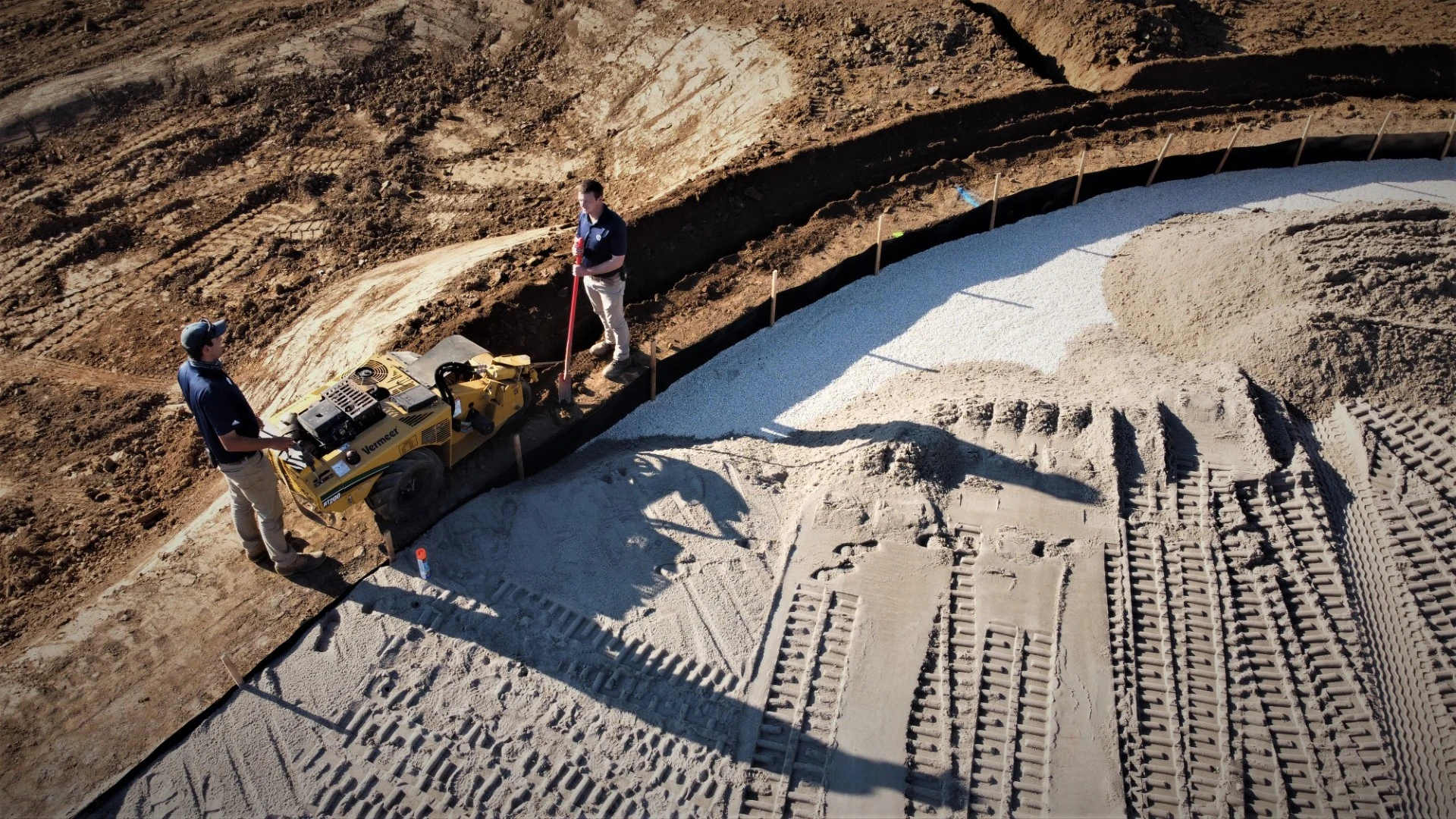
Pablo Barragan Ferreira started his first spring in America as the only occupant in a three-bedroom house surrounded by a dense stand of trees and shoulder-high shrubs. Five steps and a paved access road separate the house from his indoor workspace. Slim gaps between the trees separate the house from his outdoor workspace.
The fairway, the 18th on the South course at Carmel Country Club, is zoysiagrass, a turf species covering thousands of golf acres in this country’s toughest growing region. Zoysiagrass attracted Barragan to Carmel Country Club, where he’s living in a modest employee house, in the middle of a residential south Charlotte neighborhood, in a country with cultural, linguistic and geographic contrasts, but similar turf trends to his native Spain.
“They’re starting to turn to zoysia in Spain,” Barragan says during an early spring conversation inside a tidy Carmel Country Club maintenance facility conference room filled with course enhancement blueprints and boxes of new hats and shoes for employees. “Because of that, I’m here. I want to learn more about zoysia when it comes to Spain.”
Fellow Spainard Manuel Salado Fernández is experiencing more separation from work. His temporary employer, Quail Hollow Club, established a lease agreement with a Charlotte apartment complex to provide housing for aspiring turfgrass and club management talent. Salado doesn’t envision prolonged stretches in the apartment. Salado, like Barragan, is spending the hottest months in the Queen City for a defined career purpose.
Site of an annual PGA Tour stop and the 2025 PGA Championship, Quail Hollow is seemingly always preparing for the next big event. “I was looking for one of the top golf courses — and Quail Hollow is one of them,” Salado says. “I really love tournaments and I really love construction.”
Barragan’s and Salado’s presence in Charlotte epitomizes the measures that motivated young people — in this case, crossing an ocean and six time zones — are taking to obtain targeted training to accelerate their careers. Their respective internship programs at Carmel Country Club and Quail Hollow also demonstrate how American clubs are finding creative solutions to fill specialized positions, for a summer or perhaps even longer.
“It’s a constant recruiting effort to find good, quality turf interns and hopefully lead them into becoming future turf professionals,” says Carmel Country Club director of greens and grounds Brannon Goodrich.

The Green Section of the Spanish Royal Golf Federation is sponsoring and funding Barragan’s time in the United States. The scholarship program incorporates Barragan’s studies in the Penn State University two-year turfgrass management program. The purpose of Barragan’s stint in the United States involves requiring education and skills difficult to obtain in Spain, a country with 47.5 million residents and 408 golf facilities — which is 52 fewer than North Carolina, a state with 10.8 million residents.
Barragan, 26, says his situation would be comparable to the USGA Green Section funding an overseas study program to help a student receive high-level agronomic knowledge not easily accessible in the United States. Barragan has assisted in the agronomic efforts at Spanish tournaments, and he’s also helped underfunded facilities make improvements. “It’s an opportunity to learn, because you see a lot of golf courses,” he says. “Each one has different programs. You can learn a lot in a short time.”
His classroom learning intensified when he enrolled at Penn State last September. Barragan’s English is solid, as evidenced by the 30-minute interview he deftly navigated during a Golf Course Industry visit to Carmel Country Club. But learning new skills taught in a non-native language requires grit and calculated time management. “One U.S. student needs two hours to learn something that I need four hours to learn,” he says.
Supportive classmates and faculty eased the academic transition. “When I was in Spain, I thought people in the north of the U.S. would be closed-minded,” says Barragan, who hails from Bollullos Par del Condado, a small southern Spain town. “But it’s been different than I thought. All the people here are open-minded. They help you with everything in the class. It’s harder because of the language. Sometimes you feel impotent because you want to say something and you have to think about it first. That’s the most difficult thing for me, but it’s better than when I arrived here.”
Away from the classroom, Barragan adjusted to a different climate. Fall and winter temperatures are significantly cooler in State College, Pennsylvania, than in Bollullos Par del Condado, which possesses a Mediterranean climate with mild winters. He hasn’t attended a Penn State football game, although he plans to endure the potential cold to watch one in 2024. Barragan is an ardent soccer fan and had a monthlong stint working turf maintenance at Santiago Bernabéu Stadium, the historic home of Real Madrid.
“At the beginning (of my career) I wanted to work in a fútbol stadium,” he says. “But in a fútbol stadium all the days are the same. On a golf course, you have the opportunity to choose, because you have different heights of cut, you have bunkers, you have greens, you have more possibility to do different things.”
Goodrich and assistant superintendent Matt Brooks met Barragan at a job fair last fall in State College organized by Dr. John Kaminski, the director of Penn State’s two-year golf turfgrass management program. The scale of Carmel Country Club allows Goodrich to offer young talent opportunities to perform a myriad of tasks. The 36-hole club is flourishing, with 1,000 members and their guests playing 65,000 rounds in 2023. Goodrich leads a turf and horticulture crew of around 60 employees. Superintendent Micah Pennybaker oversees the maintenance of the South Course, which includes zoysiagrass short-cut turf and A1 bentgrass greens. Superintendent Eric Downs oversees the maintenance of the North Course, which includes 419 Bermudagrass fairways and Champion Bermudagrass greens.
“What we try to sell the turf guys is all the different grasses we have underneath this one piece of property,” Goodrich says. “Pablo was very interested in zoysia. That’s what we went to Penn State selling, … all the different grasses and we can get you out of the cold and into the South.”
Barragan is surrounded by a diverse team. Carmel Country Club has superintendents and assistant superintendents holding degrees or certificates from schools such as Auburn, Catawba Valley Community College, Clemson, NC State and Rutgers, crew members hail from multiple countries, and fellow 2024 interns represent multiple universities.
The camaraderie and demands of turf maintenance shrink the world. “This is the correct place to grow in this sector,” Barragan says.
Barragan arrived in Charlotte with a friend who can relate to his personal experiences.
Salado started at Penn State at the same time (yes, they lived together in State College) and the pair volunteered at the 2024 Players Championship before reporting to Charlotte to begin their respective internships. Barragan’s and Salado’s concurrent time in Charlotte is a coincidence.
“The U.S. is so big, so massive,” Salado says. “We spent a year together, we went to the Players together, and I was like, ‘Where are you going to do your internship?’ And he said, ‘I’m going to Carmel.’ I said, ‘I’m going to Quail Hollow. Come on man!’”
Quail Hollow is one of the Southeast’s renowned turf talent incubators. International interns were common before director of green and grounds Keith Wood’s arrival in 2015, and the club’s program continues to attract motivated young professionals from other countries, including Spain, the home of Lara Arias, the superintendent for the 2023 Ryder Cup at Italy’s Marco Simone Golf & Country Club. Arias interned at Quail Hollow in 2017, when the club hosted its first PGA Championship. International interns and employees are omnipresent at Quail Hollow.
“We are learning about their culture, learning about them, learning about how things are done in the countries they come from, learning about their parents and family atmosphere and how they share meals, celebrate holidays,” Wood says. “It makes us better people on a whole.”
During a conversation inside Wood’s office four weeks before the 2024 Wells Fargo Championship, Salado occasionally glanced at his boss’s mementos, including the South Carolina Gamecocks driver head cover. Salado, 23, is work-focused this summer — “I don’t have plans to take any days off at the moment,” he says — although he hopes to begin using his own clubs more.

“I discovered golf course management and fell in love with golf,” says Salado, who has an engineering degree from Universidad de Sevilla in southern Spain. “I try to play golf. I play really bad, but I love it. One of my goals is to grow as a greenkeeper and in turfgrass management, and to try and improve my golf.”
Wood urges interns to find time to play golf. “If you work on a golf course, you need to be able to enjoy the game of golf and go out and play every once in a while,” he says.
Barragan relishes tournament golf and his résumé includes internships at 2023 Solheim Cup site Finca Cortesin in southeastern Spain and DP World Tour site Yas Links in Abu Dhabi. Luis Pinto, a 2017 Quail Hollow intern and head greenkeeper at Ombria Resort in Portugal, connected Salado with Wood.
Quail Hollow offered Salado something difficult to find close to home. He says Spain has around 10 “really high-level golf courses.” Charlotte boasts a half-dozen upper echelon clubs, including two in the same neighborhood. Similar situations exist in other prominent U.S. markets, especially in the expanding Sun Belt. “The golf culture is really big here,” Salado says. “We don’t have that in Spain.”
Salado and Barragan love Spain, and they will likely experience homesickness at some point this summer. But advancement in the golf industry means facing unfamiliarity — and even living at work.
“I’m happy here because there are people here who speak Spanish and I can improve my English,” Barragan says. “And I also can speak Spanish with the people who speak Spanish. I’m so fortunate to stay here with these guys and learn from these guys.”

Explore the June 2024 Issue
Check out more from this issue and find your next story to read.
Latest from Golf Course Industry
- Standard Golf announces new product lineup for 2025
- The Salt Pond taps Troon for management
- KemperSports selected to manage Swansea Country Club
- From the publisher’s pen: Grab that guide
- Introducing our April 2025 issue
- South Carolina leaders honor golf course superintendent
- One and only
- Wild can be good





